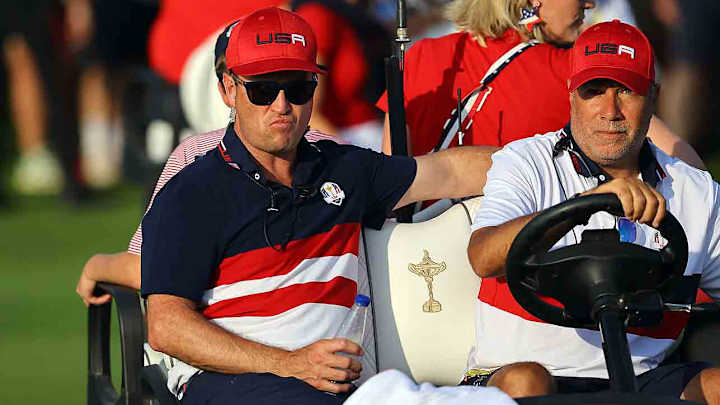Why Does This Keep Happening? The U.S. Ryder Cup Program Needs a Reboot

ROME — We’ll figure it out.
Over 580 days of his Ryder Cup captaincy, Zach Johnson believed he thought of everything. With a five-point loss on Sunday, it’s clear he didn’t think of enough.
A 4-0 loss in Friday morning foursomes was the death knell for a team that seemed disappointed—but not devastated or distraught like the Europeans were after the 10-point shellacking they took two years ago in Wisconsin.
Of course, the Euros can point to Paris in 2018 when they won by seven points ... or the Americans to Hazeltine in 2016 where they won by six ... or again the Europeans back at Gleneagles in 2014, winning by five.
The point is, this has been going on for four Ryder Cups and over those nine years, nothing has changed: the home team wins handily and the opponents leave wondering why.
In the case of the U.S., its last win on foreign soil was in 1993 and it won’t get a chance to make amends in Europe until 2027 at Adare Manor. The next chance for a home win is 2025 at Bethpage Black.
“You're conferring with the team, you're conferring with yourself and you're trying to figure out what is best, if you take, you know—trying to find the best situation that puts these guys in the position for success,” Johnson said. “And you know, 'regret' is a strong word, but I wish I would have done a better job of that. I don't know what it looks like, never will, but it's not a matter of anything other than Team Europe scored more points.”
That’s the easy answer: they played better. Or they made more putts.
Of course they made more putts. But why did they make more putts?
It’s hard to believe that the Europeans in Rome, Paris, or Gleneagles could make more putts because of a partisan crowd or that the Americans could do the same in Wisconsin or Hazeltine.
What exactly is it that makes playing on foreign soil so difficult?
In the early days of the Ryder Cup, the U.S. won almost every time the matches were played, home or away, but that all changed when Europe entered the contest and since then it has been more than competitive—it’s been a struggle for the Americans.
At first the supposed problem was that the PGA Tour players didn't hang with each other, while the Euros were all great friends, stayed in the same hotels and ate together.
That suggestion doesn't hold water today as both sides pretty much do the same things, in fact many Euros play on the PGA Tour and hang with American players.
Knowledge of the golf course, course setups, acclimating to the flights, playing too much going in or playing too little, you name it, it’s been suggested.
None of this really helps.
In his losing press conference, Johnson said he would not change anything, but admitted he was a little raw after the loss.
How change isn’t on the table after losing a seventh consecutive Ryder Cup on foreign soil seems a little delusional. But what needs to be changed?
Johnson is going to decompress and then at some point give his thoughts back to PGA of America officials, who will take it all under consideration before picking the next captain and starting all over again.
It's time for the Ryder Cup process from A to Z to be looked at from every angle.
Naming Tom Watson as captain in 2014 was an overreaction to the Medinah loss and creating the task force stemmed from the debacle Watson captained at Gleneagles.
So does a 6½ to 1½ start after Friday's two sessions require a further look? Does a five-point deficit going into Sunday singles require some analysis?
In the end no one really knows why the U.S. lost and the Europeans won, except for the old, tired thoughts of better putting or scored more points. But there is an answer: the powers that have run the Ryder Cup on the U.S. side have just not looked hard enough for it.
The process of analysis needs to be complete and thorough. Thankfully there is time, two years before New York and four years before Ireland.
Creating an office at the PGA of America solely responsible for the American Ryder Cup team is part of the solution, then maybe there will be a focus that is 24/7/365 on winning and keeping the Cup in America's hands.
It’s an easy starting point and ultimately creates some accountability, which is nonexistent when captains are recycled every two years.
It’s impossible to know if Johnson was a good captain or bad. The measure shouldn’t be if you win or lose but it ultimately is, so by that limited gauge he was not a good captain.
That in itself is too simplistic and the answer to what happened and why should be a much longer conversation, leading to concrete reasons for the American failure.
It’s up to the officers of the PGA of America. They ultimately decide, and they are now on the clock.

Alex Miceli, a journalist and radio/TV personality who has been involved in golf for 26 years, was the founder of Morning Read and eventually sold it to Buffalo Groupe. He continues to contribute writing, podcasts and videos to SI.com. In 1993, Miceli founded Golf.com, which he sold in 1999 to Quokka Sports. One year later, he founded Golf Press Association, an independent golf news service that provides golf content to news agencies, newspapers, magazines and websites. He served as the GPA’s publisher and chief executive officer. Since launching GPA, Miceli has written for numerous newspapers, magazines and websites. He started GolfWire in 2000, selling it nine years later to Turnstile Publishing Co.